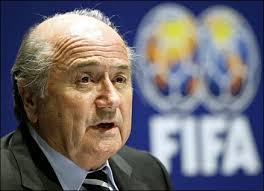By Andrew Warshaw, chief correpondent, in Mauritius
May 29 – Sepp Blatter’s personal crusade to clean up FIFA after years of scandal and corruption has taken a massive hit with the news that age restrictions and term of office limits for FIFA officials – viewed as a key part of the two-year road map to reform – have been dropped from the agenda at Friday’s annual congress.
Neither of the reform proposals will be put to the Congress vote after members of the executive committee were unable to agree during Tuesday’s meeting to decide exactly which reform measures would go before FIFA’s 209 member countries.
The concept of age and term limits followed the biggest crisis in FIFA’s history with a string of veteran powerbrokers either being suspended or resigning over bribery and corruption. Restricting mandates among FIFA’s top brass was viewed as one way of making sure senior officials – including the President himself – did not occupy dominating positions for uncomfortable lengths of time and that leadership could be renewed.
But with the UEFA majority on FIFA’s executive committee wanting one set of measures and other confederations preferring another, it was decided to postpone the whole debate until next year’s Congress in Sao Paulo.
“As no consensus has been reached among the member associations and their confederations on the agenda items ‘term of office’ and ‘age limit’, a more thorough analysis is required,” a FIFA statement said. “Therefore, both items will be examined further and the Congress will be asked to put them back on the agenda of the 2014 FIFA Congress with concrete proposals.”
Chaired by Blatter, the executive committee decided to go ahead with other statute-changing measures including integrity checks for newly appointed executives (though conducted at confederation level rather than by an independent panel), more women to serve on the executive committee and rubber-stamping the already agreed move that future World Cup hosts will be decided by FIFA’s full membership rather than by the votes of the elite all-powerful executive committee alone.
The news that age and term limits have been dropped will be viewed by sceptics as precisely the kind of fudging many suspected would happen this week in Mauritius. It is understood some members of the executive committee wanted to do nothing and simply preserve the status quo. Sources close to the executive committee told InsideWorldFootball there were simply too many differing views over what kind of ceiling to impose for serving members, and how many mandates they should be allowed to hold.
Significantly, Blatter who is 77 and midway through his fourth term which expires in 2015, would be able to run for the FIFA presidency again. He has recently suggested that he might not step down once his current term ends. “The feeling was that if the age and term limits were put to Congress, they both would have been defeated because no-one knew which was the right one,” said one well-informed source. “The European members wanted three terms but others preferred age limits. There were therefore no concrete proposals. Neither of them would have got the majority required and would have been blown out of the water for good. “
Even before today’s decision, Blatter made clear his opposition to age limits for FIFA positions, saying they could be “seen as discriminatory”. In comparison, the International Olympic Committee, of which Blatter is a member, has age limits.
By postponing for a year, everyone is still in the dark about what the time frame will eventually be. Eight years or 12 years as president? How many mandates for executive committee members? A 72-year-old age limit or higher?
If Blatter does decide to go for a fifth term, how would he be viewed, said another insider, if newly imposed statutes were to cover future FIFA presidents but not himself? He would be 83, it was pointed out, when his fifth term ends.
Contact the writer of this story at moc.l1745666438labto1745666438ofdlr1745666438owedi1745666438sni@w1745666438ahsra1745666438w.wer1745666438dna1745666438

